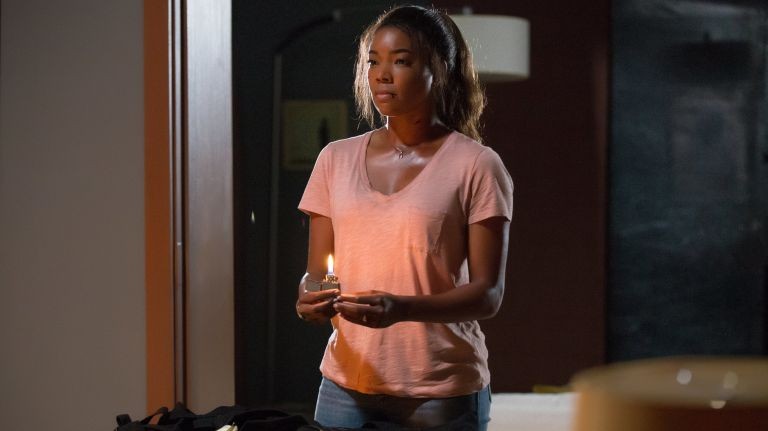Violence is thrilling in a fictional setting. When heroes visit it upon malcontents, the audience living vicariously through them gets feelings of triumph. This is all cover so that we can assert murderousness in a safe space where it won’t hurt anyone, and go home having let loose our bloodlust. A particularly good cover is protecting the family unit.
Breaking In, a home invasion thriller produced by and starring Gabrielle Union, is paint-by-the-numbers. Exactly what you expect to happen, happens, but there is charm in its efficiency. Shaun (Union) travels with two kids to the countryside to close up her murdered father’s estate in order to sell it. A quartet of thieves are already there, intent upon getting past the state-of-the-art surveillance system. Union must use all her strength to defeat them and save her children. No time is wasted on her father’s murder. There are Shining-like shots of her car on long roads, a brief setup of the generic siblings’ relationship, and images of Shaun looking at her father’s coffee cups and broken picture frames set to sad piano music. Her son (Seth Carr) is shown flying a drone through the house, in order to establish its use for later. Then people start getting grabbed and dragged into shadows, and we’re off.

Billy Burke and Gabrielle Union face off in Breaking In.
The villains are familiar: they consist of a beleaguered pro who has seen it all (Billy Burke), the eager-to-murder wild card (Richard Cabral), an inexperienced youth having second thoughts (Levi Meaden), and a fourth (Mark Furze) whose most distinguishing feature is looking like Gordon Freeman from Half-Life, with thick-rimmed glasses and a crowbar.
They are introduced bickering and proceed to follow the unsoundly procedural steps by which homicidal thieves regularly underestimate working moms. Burke is best, with majestic swooped-back hair and a mostly there beard. He alternates between the weariness of a guy who has seen this all before and Bond-suave pronouncements like “I imagine in this moment you’re wondering whether you and your kids will make it out alive,” and “You’re a woman alone at the mercy of strangers. Your greatest weakness is trapped inside the house.” (He means her kids.) As the odds increase in Shaun’s favor, several of his lines are repeated back to him. The conversational throughline among his compatriots is calling Shaun a “bitch.”

Gabrielle Union has a light.
My audience was wry. The robbers were a little too hapless for them: they laughed at odd looks on their faces and unintentional moments of awkwardness. Sometimes even the appearance of Meaden’s character, with his dyed yellow hair and unthreatening demeanor, would bring the house down. One such moment was when he began to dry off safe-cracking electronics Shaun had submerged in a sink full of water, presumably because it was a stupid, hopeless task. (The audience even laughed at the final image of the film, probably because of the extreme lateness of police arrival.)
Union is good as a sexual assault survivor, which brings an emotional, personal undercurrent to scenes of her being attacked and thrown about by the different men. Her hard-won dominance over them prompted cheers. The script gave her triumphant lines like “You broke into the wrong fucking house,” and “I’m just a mom,” and my fellow viewers got it. On leaving they noted happily she was a “mean momma,” and the intruders’ mistake was getting near a “lion and her cubs.”
As Union wrote about her own history in regards to the controversy around The Birth of The Nation in 2016, assault in real life produces post-traumatic stress disorder, from which she suffers. It’s only in art that we can find catharsis through violence. Besides the fun of seeing this with an audience perfectly keyed into the familial triumph it was selling, I surmised from Union’s producer credit that it was a personal story she wanted to tell. I watch a lot of amateur true crime stories on Youtube, which I find fascinating. There’s no quicker way to remind oneself of the vastness of our world: the unknown and unexplained dead branch out in every direction in endless patterns. It’s good to find meaning in crime instead of mystery, and see a person purposefully tell the story of making one’s way back from trauma.
Breaking In
